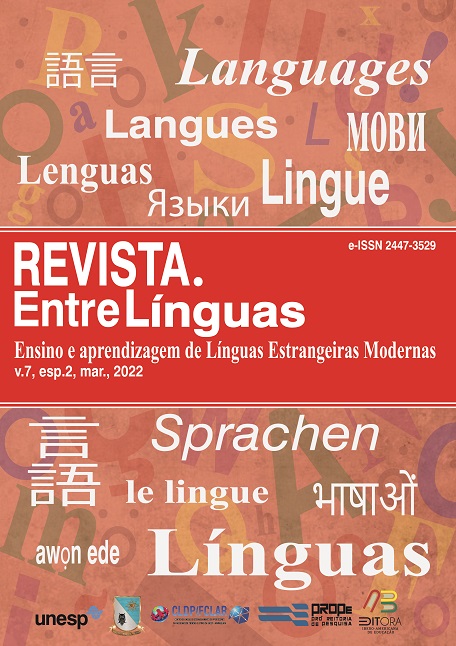Artistic linguistic features of epistolary style in the creative activities of the representative of Nakhchivan literary setting in XIX-XX centuries
DOI:
https://doi.org/10.29051/el.v8iesp.2.17307Keywords:
Nakhchivan, Epistolary style, Letter, Monologue, DialogueAbstract
The article discusses the significance of epistolary style in the development of artistic language and also shedding light upon the issues of investigating the language of official and personal correspondences of art figures. The epistolary style found in the creative activities of the representatives of Nakhchivan literary setting distinct for their uniqueness and differs from other styles by its artistic – publicistic features, autobiographic content, and essence. It was possible to ascertain various signatures found in the letters of prominent figures, their attitude towards the socio – political processes of the period, their relationships with close people, and their literary – artistic views. The letters reflecting personal relationships between the representatives of Nakhchivan literary setting made it possible to access information regarding the history, literature, culture, and press of Azerbaijan.
Downloads
References
AKBAROV, Alistan. Stylistics of modern Azerbaijani language. Baku: ADPU publishing house, 2016. 359 p.
ASADULLAYEVA, Mehriban. Literary linguistic peculiarities in Aziz Sharif’s creative activity. Baku: AMEA Linguistics Institute named after Nasimi, 2019. p. 26-34.
AZIMOVA, Aygun. Literary publicism of Azerbaijan in independence period. Baku: “Elm va tehsil” publication, 2018. 203 p.
BUDAGOVA, Zarifa. Stylistics of the Azerbaijani language. Baku: “Elm” press, 1990. 148 p.
GADIMOV, Asgar. Ordubad literary setting in XIX century. Gudsi Vanandiv. Baku: “Elm” publishing house, 2003. 376 p.
GURBANOV, Afad. Modern Azerbaijani literary language. In 2 vols. Vol. 1. Baku: “Nurlan” press, 2003. 450 p.
HAJIYEV, Tofig. History of Azerbaijani literary language. Part II. Baku: “Elm” press, 2012. 392 p.
KHALILOV, Buludkhan. Anthology of Azerbaijani language. Baku: “Elm va tehsil” publication, 2012. 648 p.
KHUDIYEV, Nizami. Literary linguistic history of Azerbaijan. Baku: “Elm va tahsil” publication, 2012. 686 p.
MAMMADOV, Kheyrulla. Azerbaijani literature in XIX century. Baku: CBS Press, 2006. 212 p.
MEHDIYEV, Shahismayil. Methodology of teaching stylistics (Learning resource). Baku: “Tahsil” Elm press, 2009. 44 p.
MUSTAFAYEV, Mustafa. Azerbaijan’s realist poetry in XIX century. Baku: AGPI, 1991, 103 p.
MUSTAFAYEVA, Gizgait. Stylistics of Azerbaijani language. Baku: “Elm” press, 2010. 384 p.
PASHAYEV, Mir Jalal. Fuzuli’s mastery. Baku: Chashioglu press, 2018. 348 p.
SHARIFOVA, Salida. Evolution and formation process of Azerbaijani fiction genre (until early XX century). Baku: “Elm” press, 2005. 240 p.
Published
How to Cite
Issue
Section
License

This work is licensed under a Creative Commons Attribution-NonCommercial-ShareAlike 4.0 International License.
Os manuscritos aceitos e publicados são de propriedade da Revista EntreLínguas. Os artigos publicados e as referências citadas na Revista EntreLínguas são de inteira responsabilidade de seus autores.
Transferência de direitos autorais – autorização para publicação
Caso o artigo submetido seja aprovado para publicação, já fica acordado que o(s) autor(es) autoriza(m) a UNESP a reproduzi-lo e publicá-lo na EntreLínguas, entendendo-se os termos “reprodução” e “publicação” conforme definição respectivamente dos incisos VI e I do artigo 5° da Lei 9610/98. O artigo poderá ser acessado pela rede mundial de computadores (Internet), sendo permitidas, a título gratuito, a consulta e a reprodução de exemplar do artigo para uso próprio de quem a consulta, desde que haja a citação ao texto consultado. Essa autorização de publicação 328 EntreLínguas, Araraquara, v. 1, n .2, p. 323-328, jul./dez. 2015 não tem limitação de tempo, ficando a UNESP responsável pela manutenção da identificação do(s) autor(es) do artigo. Os artigos publicados e as referências citadas na Revista EntreLínguas são de inteira responsabilidade de seus autores.











